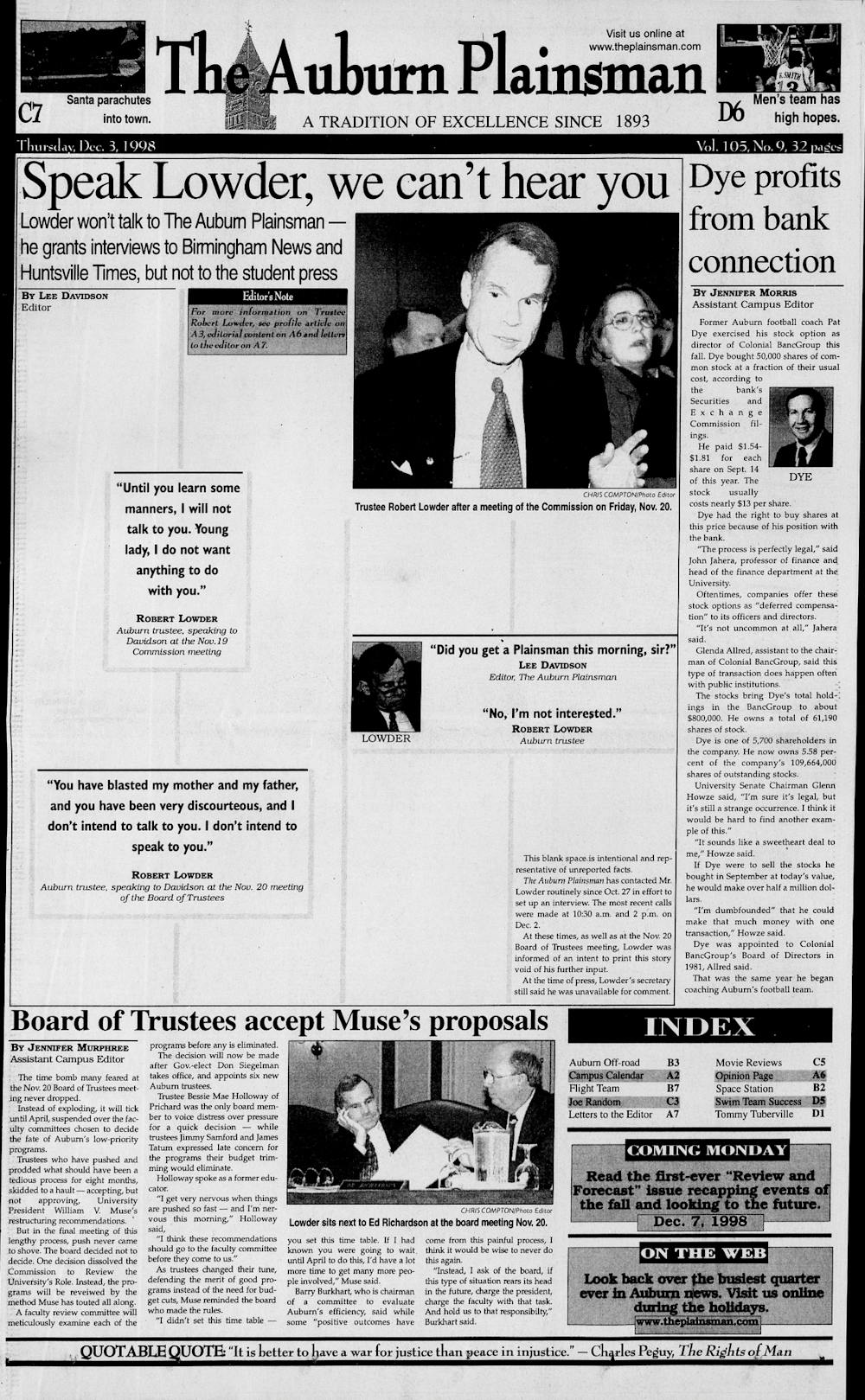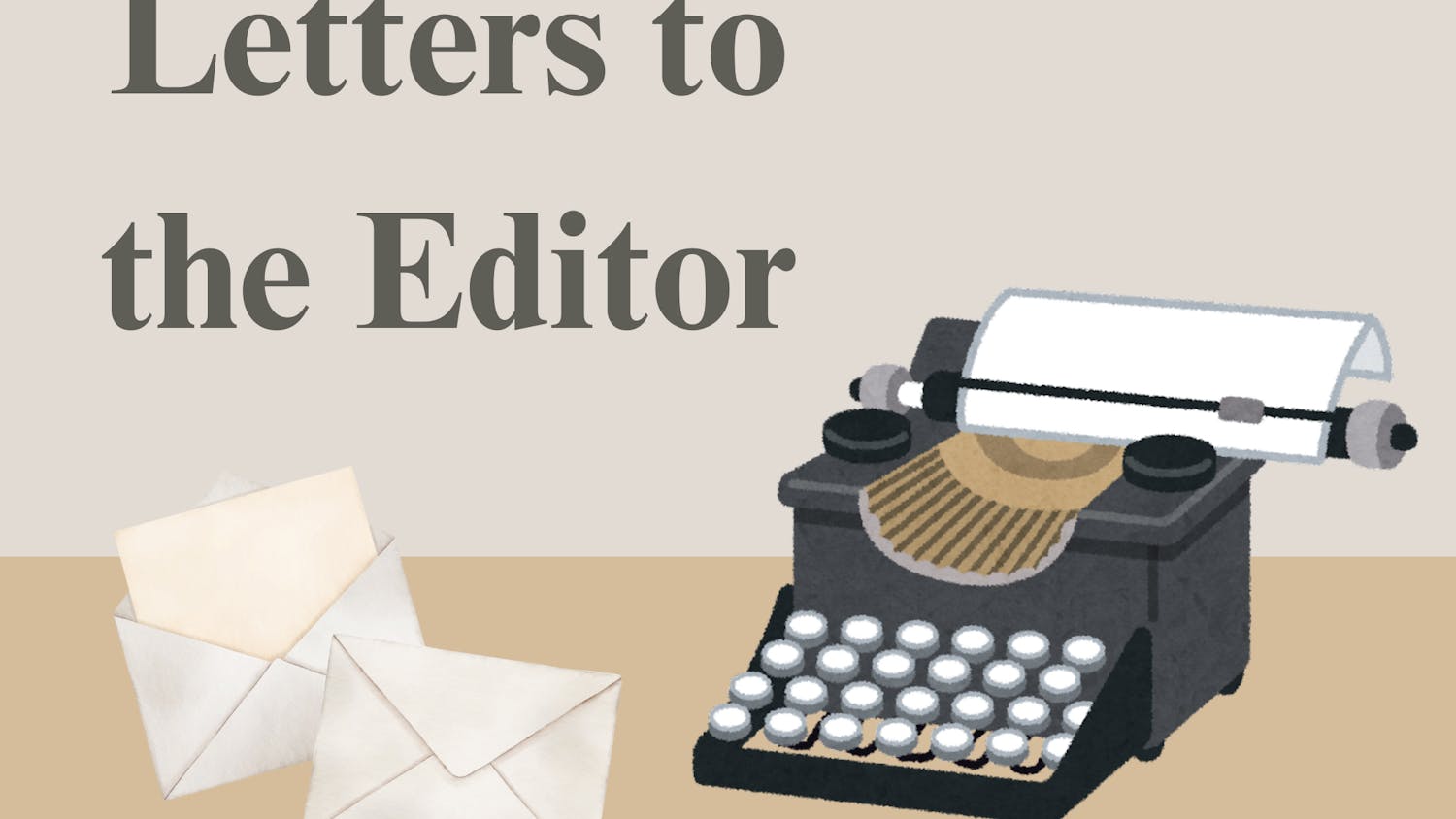On the final Thursday morning of the 1998 Auburn University fall semester, students lined up to claim their copy of the latest release of The Auburn Plainsman – only to see a gaping, white front page that left campus buzzing.
“I really wanted people to think, ‘Wow, they made a big mistake. They didn’t hit paste. They didn’t copy over their story. Look at those idiots,’” said Lee Davidson Holt, 1998-99 Editor-In-Chief of the Plainsman. “The headline and the pull-out quotes told the story.”
The unfulfilled page was the product of 1999 Auburn journalism graduate, then known as Davidson, approaching Auburn Trustee Robert Lowder at two consecutive Auburn Board of Trustee meetings, shaking his hand, looking him in the eyes and politely asking him for an interview.
“Speak Lowder, we can’t hear you” was the headline, and the pull-out quotes gave Lowder’s response to Holt’s sincere request.
“Until you learn some manners, I will not talk to you,” Lowder replied at the Nov. 19 Auburn Commission meeting. “Young lady, I do not want anything to do with you.”
Giving Lowder a chance at repentance before the Plainsman took action, Davidson inquired yet again at the board of trustees meeting the following night. – getting the same result.
“You have blasted my mother and my father, and you have been very discourteous, and I don’t intend to speak to you,” Lowder said.
Lowder granted interviews to other media outlets – The Birmingham News and Huntsville Times – but refused comment to Davidson and the Plainsman staff as a result of previous reporting and editorial content published by the Plainsman that Lowder didn't like.
In the name of transparency, Davidson outlined the exact dates and times when they asked Lowder for interviews in an editor's note at the bottom of the page. In a story later in that Dec. 3 paper, Davidson fully outlined her encounters and mannerisms in dealing with Lowder and formatting that issue's cover page in a story titled "Blank space emphasizes importance."
Holt recalled doing previous reporting on then-Auburn University President William Van Muse and his intention to merge the nursing school, the degradation of the aviation management program, Lowder’s role in the 1998 resignation of head football coach Terry Bowden, running editorials on program cuts, publishing an editorial titled "Bobby Lowder: AU is not for sale" and a story written by Davidson in November 1998 titled "Lowder University crumbles."
These articles were critical, undoubtedly, but none of the content was legally punishable or defamous because it aired on the side of independence, transparency and truth. It was simply good, hard-hitting, clean journalism that people weren't accustomed to from student papers.
“The Auburn spirit represents truth, and we represent truth,” Holt said. “We’re not being down on Auburn by investigating Auburn, we’re showing we love Auburn by investigating Auburn.”
As Sallie Owen of the Dadeville Record wrote in her Jan. 1999 piece, "Newspapers are simply mirrors," the Plainsman's reporting held a mirror in front of Auburn – illuminating negatives that it didn’t want to be publicized. That is a responsibility of the press, student or not, but Davidson was punished for it.
“Being irresponsible in several situations regarding the news and editorial content concerning Robert Lowder’s role on the Auburn University Board of Trustees” was the reasoning given by the Auburn University Communications Board for the 5-4 vote to censure Davidson and remove her from office of Plainsman EIC, according to Ed Williams, who served as the Plainsman’s faculty adviser at the time.
As it is now, The Plainsman was then a self-supporting, financially independent organization, which paid rent for its office space in Foy Student Union Building at the time. It had not received Student Government Association funding since 1984, Williams added.
Not only were they financially independent, but she and other staff members reported on fully staff-driven content – meaning they were not restricted, censored or advised by the University or even the Plainsman's advisor. In fact, Holt noted that Williams didn't read the paper until it was distributed on Thursday mornings "like everyone else." Williams agreed.
The communication board attempted to censor the Plainsman, an independent organization that they had little or no affiliation with. And truth was not at debate – it was simply that the board didn’t like what Davidson said.
“And that’s the cool thing about it – a lot of people said ‘We don’t agree with your opinion.’ No one said ‘Your facts are wrong,’” Holt said.
But there’s a reason why the Plainsman abides by the motto “A spirit that is not afraid.”
Davidson set an example for her student media successors. She fought back against the censure by bringing in legal help, and the board immediately reversed the vote.
“I do not think the five communications board members who voted for the censure had any idea of the furor that their actions would create,” Williams wrote in a 1999 column in the Associated Press. “Never (in 23 years as faculty adviser) was I associated with college journalists with more maturity, drive, courage and conviction than that 1998-99 Auburn Plainsman editor and her staff.
“Lee Davidson was accompanied to the board meeting by Montgomery attorney Dennis Bailey, Auburn journalism graduate, hired by the Auburn Plainsman to represent her… The meeting was quickly adjourned when Lee walked into the room with legal counsel.”
It is moments of bravery like these that have allowed the Plainsman to be what it is today. It was a scene of growth and learning for everyone involved, and it is one that keeps on teaching.
“Never in my 23 years as faculty adviser of the Plainsman did I experience a year that demonstrated so clearly the importance of student media and freedom of the press,” Williams said. “Student discussions ensued on government censorship, freedom of the press, the protection that is provided by the First Amendment and the awesome responsibilities that come with that protection."
The Plainsman lived on to write about it, and it only got stronger because of the trying situation. The next month, the Plainsman wrote about the injustices of the attempted censorship in "Comm Board to crumble." This time, the front page was as full as ever, and people raided the newspaper racks to read it on that February Thursday morning all the same.
“Newspaper staffers wore t-shirts with the First Amendment printed on the back," Williams said. "Underneath, 'Read The Auburn Plainsman.'"
Do you like this story? The Plainsman doesn't accept money from tuition or student fees, and we don't charge a subscription fee. But you can donate to support The Plainsman.





